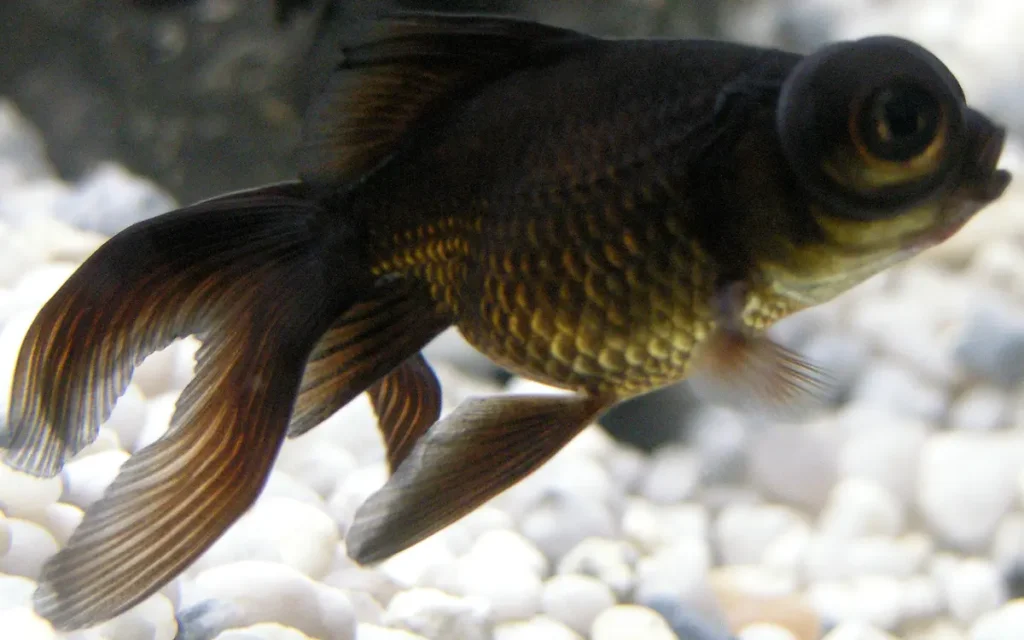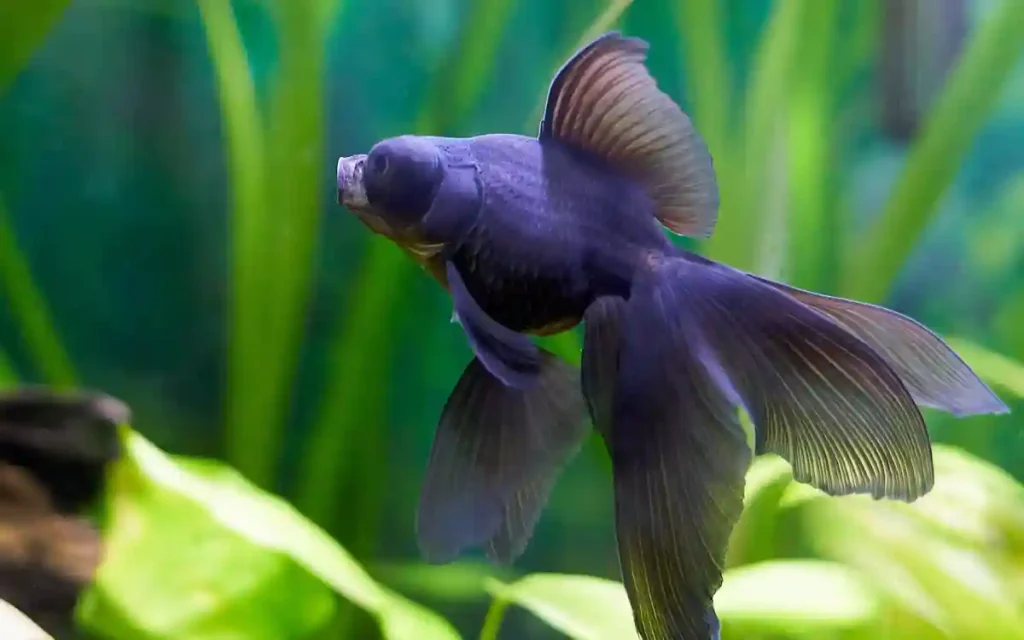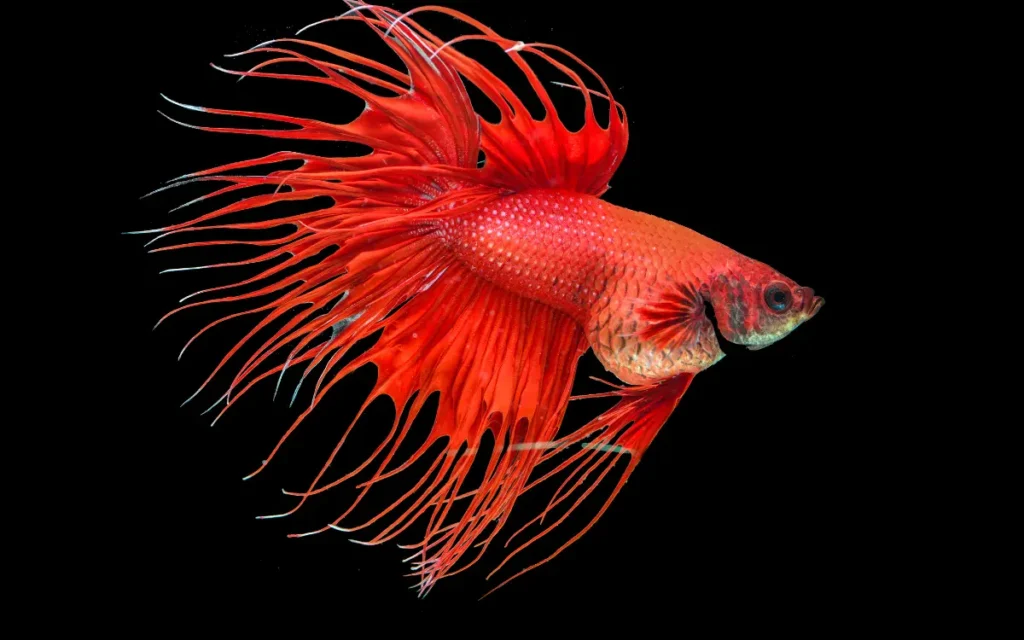Black Moor goldfish are one of the most visually unique fancy goldfish varieties. Known for their velvety black color, deep bodies, and protruding telescope eyes, they’re gentle, hardy, and a favorite among aquarists who love slow-moving, ornamental fish.
This guide covers everything you need to care for a Black Moor goldfish, including tank setup, diet, water parameters, and common issues.

Quick Species Profile
| Feature | Details |
| Scientific Name | Carassius auratus (Black Moor) |
| Common Name | Black Moor Goldfish |
| Size | 6–8 inches |
| Lifespan | 10–15 years (with good care) |
| Origin | China (bred from telescope goldfish) |
| Temperament | Peaceful, slow swimmer |
| Tank Size | 20+ gallons per fish |
| Temperature | 65–75°F |
| pH Range | 6.5–7.5 |
What Is a Black Moor Goldfish?
Black Moors are a type of fancy goldfish characterized by their bulging eyes, round bodies, and striking black coloration. They are a variety of telescope goldfish, but they maintain a consistent black color throughout their lives (though some fade with age).
Due to their eye shape and slow swimming, they require special care compared to more streamlined varieties.
Lifespan
With clean water and proper care, Black Moors can live 10 to 15 years in an aquarium. Some even surpass this in well-maintained ponds, though their poor eyesight makes tanks the safer option.
Size & Growth
Black Moors grow slowly but steadily. Most reach 6 to 8 inches, though in larger environments, they can grow slightly bigger. Provide ample space to accommodate their growth and swimming style.
Tank Size & Setup
A single Black Moor needs a 20-gallon tank minimum. Add 10–15 gallons for each additional fish. Since they are poor swimmers, choose a long, horizontal tank with minimal current.
Tank setup tips:
- Use soft sand or fine gravel to avoid injury
- Avoid sharp decor or rough plants
- Include silk or hardy live plants for enrichment (e.g., anubias, java fern)
- Provide open space for swimming
Water Parameters
Keep these parameters stable:
- Temperature: 65–75°F
- pH: 6.5–7.5
- Ammonia/Nitrite: 0 ppm
- Nitrate: <40 ppm
Test water weekly and perform 25–50% water changes to maintain cleanliness.
Filtration & Maintenance

Black Moors produce lots of waste, so a strong filtration system is essential. Use a sponge filter or pre-filter sponge to protect their delicate eyes and fins. Pair it with a hang-on-back or canister filter for biological and mechanical filtration.
Diet & Feeding
Like other goldfish, Black Moors are omnivores. Their diet should include:
- Sinking goldfish pellets (to avoid buoyancy issues)
- Blanched vegetables (peas, zucchini, spinach)
- Occasional frozen treats (bloodworms, brine shrimp)
Feed 1–2 times per day. Offer small portions they can finish in under 2 minutes. Monitor uneaten food to prevent water issues.
Behavior & Temperament
Black Moors are peaceful, gentle, and curious. Their poor eyesight makes them slower feeders, so avoid aggressive or faster tank mates. They interact well with calm fancy goldfish and can learn feeding schedules.
Tank Mates
Best companions include:
- Other fancy goldfish (Oranda, Ranchu, Fantail)
- Peaceful fish like white cloud mountain minnows
- Nerite snails or mystery snails
Avoid:
- Common goldfish, comets (too fast)
- Nippy species like barbs or bettas
- Shrimp (may be eaten or outcompete them at feeding time)
Common Health Concerns
Common issues include:
- Swim bladder disorder
- Cloudy eyes (due to poor water)
- Fin rot
- Eye injuries from decor or tank mates
Maintain good water quality, avoid overcrowding, and treat early signs promptly.
Breeding Black Moors
Breeding is possible but requires preparation. Males develop white tubercles on their gill covers and fins. Females release eggs on plants or spawning mops, and males fertilize them.
Separate parents post-spawning to prevent egg eating. Feed fry with baby brine shrimp or specialized fry food.
Final Thoughts
Black Moor goldfish are a calm, captivating addition to any aquarium. Their velvety color and flowing fins make them a true centerpiece fish. With proper care, they’ll reward you with years of companionship.

 **2. Platy** Platies are hardy and easygoing. They enjoy swimming in groups and come in a variety of bright colors. Great for peaceful community tanks. ➡️ [Platy Fish Guide →](#) **3. Zebra Danio** Known for their energy and toughness, zebra danios are perfect for cycling new tanks. They tolerate a wide range of conditions and like to dart around in groups. ➡️ [Zebra Danio Guide →](#) **4. Corydoras Catfish** Peaceful bottom-dwellers that help keep your tank clean. Keep them in groups of 3 or more and give them soft substrate. ➡️ [Cory Catfish Care →](#) **5. Molly** Adaptable to various water conditions (even brackish), mollies are lively and great for community aquariums. ➡️ [Molly Fish Care Guide →](#) **6. Swordtail** Easy to care for and great in peaceful groups. Males have a signature sword-like tail and love swimming space. ➡️ [Swordtail Fish Guide →](#) **7. Betta Fish** Low-maintenance and visually stunning. Best kept alone or with very peaceful tank mates like snails or Corydoras. ➡️ [Full Betta Fish Care Guide →](#) **8. Neon Tetra** Small and peaceful, neon tetras love to school and light up a planted tank. Keep them in groups of 6 or more. ➡️ [Neon Tetra Care Guide →](https://oceanbitez.com/neon-tetras/) **9. Harlequin Rasbora** A calm and schooling species that fits right into community setups. Easy to feed and care for. ➡️ [Harlequin Rasbora Guide →](#) **10. Dwarf Gourami** A gentle and colorful addition to a beginner’s tank. Likes planted environments and peaceful neighbors. ➡️ [Dwarf Gourami Guide →](#) **11. White Cloud Mountain Minnow** Can live in cooler temperatures and is perfect for unheated tanks. Small, peaceful, and easy to care for. ➡️ [White Cloud Minnow Guide →](#) **12. Cherry Barb** Peaceful and social, cherry barbs do well in planted tanks and enjoy being in small groups. ➡️ [Cherry Barb Care →](#) --- ### Sample Beginner Tank Combos **Combo 1: 10–15 Gallon Easy Starter** * 4–6 Guppies * 3 Corydoras Catfish * 1 Nerite Snail **Combo 2: 20 Gallon Planted Community** * 6 Harlequin Rasboras * 6 Neon Tetras * 1 Dwarf Gourami * 3 Otocinclus (optional if algae control is needed) --- ### Beginner Tips for a Successful Aquarium * Cycle your tank before adding fish (ammonia → nitrite → nitrate) * Start with hardy species before delicate ones * Feed small amounts once or twice daily * Do weekly partial water changes (20–30%) * Don’t mix aggressive or fin-nipping species * Use a heater for tropical fish (75–80°F) --- ### Final Thoughts These beginner fish are ideal for getting started in the hobby without frustration. They're low-maintenance, compatible, and fun to watch. Once you’re comfortable, you can explore more advanced species and community combinations. ➡️ Check out our full guide to [Freshwater Aquarium Fish →](https://oceanbitez.com/freshwater-fish/)](https://oceanbitez.com/wp-content/uploads/2024/06/Best-Freshwater-Fish-for-Your-Aquarium-1024x640.webp)
